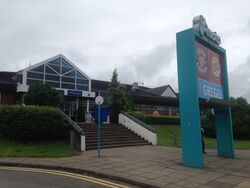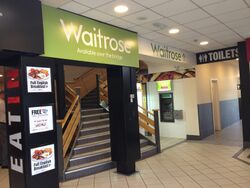Disabled Access

Motorway service areas are expected to be fully accessible to the disabled. New buildings always are, as they are usually built on a flat surface for commercial reasons.
Unfortunately, many motorway service areas date back to the 1960s, a time when accessibility was given much less thought. While the majority of the old buildings have been retrofitted with lifts, some bridges and upper levels are still inaccessible, and of course having to wait for an elevator isn't a fair experience anyway.
Motorway Services Online does list which service areas have bridges, but as we rely on third party updates, we are not in a position to say which service areas are fully accessible, as we don't receive frequent updates on what's broken. If accessibility is important to your visit, you should check with the service area operators. Many service areas are listed on the extremely detailed AccessAble guide, which may help you. Our "quick to use?" rating is expected to consider walking distances, among other factors.
Many motorway service areas now have Changing Places close to the entrance, but these still sometimes require a companion to go ahead to request assistance.
Accessibility Requirements
The service area regulations do state that all service areas which are signposted from a major road must be fully accessible. However, this requirement is only imposed on new facilities.
The same regulations used to detail the number of disabled toilets required, but this appears to have been removed as part of the government's 2013 deregulation. The position and accessibility of disabled toilets has never been regulated: in practice, this means that disabled toilets will often be at the far back of the building and will often be locked by a key that the staff have access to. Operators should be aware that not every disability is visible.
The regulations do state that at least two disabled parking spaces must be provided, "adjacent to the front entrance" of the building. Two more spaces should be provided for any hotel. Changing Places are required in all new facilities.
A symbol denoting that the service area is accessible to the disabled was used on road signs from 1982 until 2008. At this point the argument was made that every service area was using the same symbol, so it was removed.
The motorway service area requirements for England are written by National Highways. They only have jurisdiction over English trunk roads, but their policies are loosely copied across the UK.
Accessibility History

As suggested above, accessibility was not a consideration during early service area design. It would later turn out that steps are a major barrier to getting customers to spend money, and this is most likely the reason why service area buildings became flatter and wider. This priority can be seen with the service areas which have escalators to get people up to the restaurants, but nothing to help them get back down again.
Disabled toilets and ramps would become common sights by the 1980s, but they were afterthoughts. For example at Cardiff West (built in 1990), the main entrance is only accessible by steps, and a whole separate entrance and separate car park is provided for disabled visitors. (Though some may argue this was more considerate than providing a lengthy ramp instead.)
Even at this stage, it was common for older service areas to have facilities which are only available by steps. At Rothersthorpe (built 1979), there was a small seating area for people to wait while they sent someone up to the restaurant, which remained into the 1990s: it was evidently easier to provide this than a lift.
By the 2000s, new service area buildings would almost always be designed with no steps in the public concourse. Changing Places became a required facility in 2022.
Wider Issues
While the industry has started to respond to physical disabilities, not every disability is visible.
Creating a fully accessible service area also means addressing issues such as ensuring the flooring doesn't cause issues with glare or look slippery, that patterns and colours don't cause confusion, that lighting levels are suitable, that music doesn't cause irritation, that there is suitable contrast around walls, floors and steps, that internal signage is clear and consistent, and that adequate staff assistance is available. Busy buildings ought to ensure that they try to make sure that they are considerate of people who may find disorganised crowds distressing. This is not an exhaustive list, but an attempt to outline that there is plenty of work to be done, and some accessibility issues are easier to resolve than others.
According to AccessAble, four motorway service areas have designated places of safety for people with dementia, autism and learning disabilities. These are the Tibshelf northbound hotel (M1), the Lancaster southbound multi-faith room (M6), the Blackburn with Darwen meeting room (M65) and the Strensham southbound sensory room (M5).